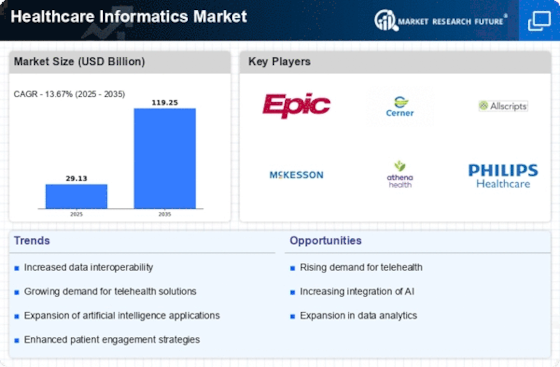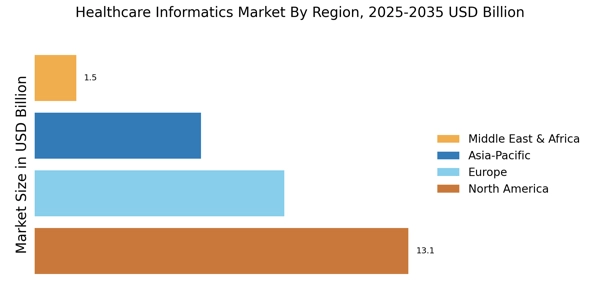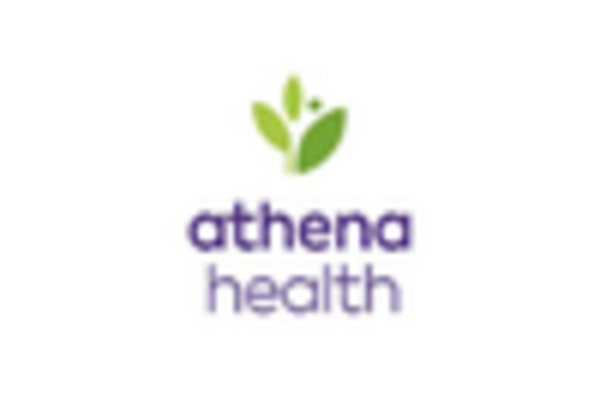Expansion of Mobile Health Applications
The proliferation of mobile health applications is significantly influencing the Healthcare Informatics Market. With the increasing penetration of smartphones and the growing acceptance of mobile technology in healthcare, patients are now able to access health information and services at their fingertips. Mobile health apps facilitate remote monitoring, medication management, and health tracking, empowering patients to take charge of their health. The market for mobile health applications is projected to witness substantial growth, driven by the demand for convenient and accessible healthcare solutions. As healthcare providers recognize the potential of mobile technology to enhance patient engagement and improve health outcomes, the Healthcare Informatics Market is likely to expand, fostering innovations that leverage mobile platforms for healthcare delivery.
Growing Demand for Patient-Centric Care
The Healthcare Informatics Market is experiencing a notable shift towards patient-centric care, driven by the increasing demand for personalized healthcare solutions. Patients are now more informed and engaged in their health management, leading to a rise in the adoption of technologies that facilitate better communication and data sharing between patients and providers. This trend is reflected in the growing use of electronic health records (EHRs) and patient portals, which enhance patient access to their health information. According to recent data, the market for patient engagement solutions is projected to reach substantial figures, indicating a robust growth trajectory. As healthcare providers strive to meet these evolving expectations, the Healthcare Informatics Market is likely to expand, fostering innovations that prioritize patient needs and preferences.
Rising Cybersecurity Concerns in Healthcare
As the Healthcare Informatics Market expands, so do the concerns regarding cybersecurity. The increasing digitization of health records and the adoption of connected devices have made healthcare organizations more vulnerable to cyber threats. Data breaches can lead to significant financial losses and compromise patient privacy, prompting healthcare providers to invest in robust cybersecurity measures. The market for healthcare cybersecurity solutions is expected to grow as organizations seek to protect sensitive patient information and comply with regulatory requirements. This heightened focus on cybersecurity is likely to drive innovations in the Healthcare Informatics Market, as companies develop advanced technologies to safeguard health data and ensure compliance with security standards.
Regulatory Support for Health IT Initiatives
Regulatory frameworks are increasingly supporting the advancement of health information technology, which is a key driver in the Healthcare Informatics Market. Governments and regulatory bodies are implementing policies that promote the adoption of health IT solutions, such as EHRs and health information exchanges (HIEs). These initiatives aim to improve healthcare quality, enhance patient safety, and reduce costs. For instance, the implementation of the 21st Century Cures Act has encouraged interoperability and data sharing among healthcare providers. This regulatory support is expected to bolster the Healthcare Informatics Market, as organizations seek to comply with new standards and leverage technology to improve operational efficiency and patient outcomes.
Integration of Advanced Analytics in Healthcare
The integration of advanced analytics into healthcare practices is transforming the Healthcare Informatics Market. Healthcare organizations are increasingly utilizing data analytics to derive insights from vast amounts of health data, enabling them to make informed decisions and improve patient care. Predictive analytics, for example, is being employed to identify at-risk patients and optimize treatment plans. The market for healthcare analytics is projected to grow significantly, driven by the need for data-driven decision-making. As healthcare providers recognize the value of analytics in enhancing operational efficiency and patient outcomes, the Healthcare Informatics Market is likely to witness substantial growth, fostering innovations that leverage data for improved healthcare delivery.


















